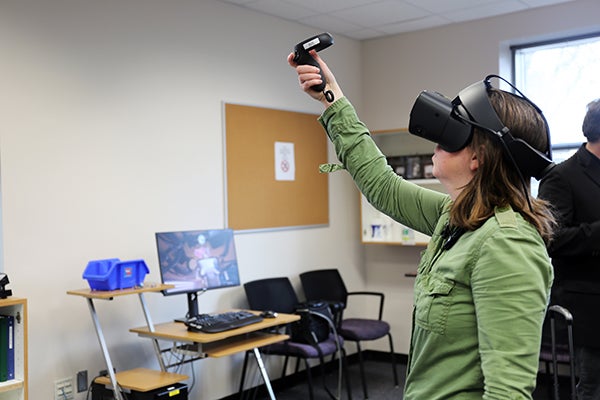College of Education lab explores campus-wide research to help students
The East Carolina University College of Education has opened a new lab that focuses on neurocognition and implementation of educational practices to better help students.
The Neurocognition Science Laboratory, directed by Dr. Richard Lamb and located in 128 Rivers Building, is known as a translational research hub.
“What that means is we’re interested in taking research about teaching and learning from lots of different disciplines, including education, and making it practical for somebody that’s either going to teach in a classroom or allows us to make better decisions about how students learn in the classroom,” he said.

During the Neurocognition Science Laboratory’s open house, people learned about different technology the lab uses, including virtual reality systems like the Oculus Rift. (Photos by Kristen Martin)
To do this, the lab uses three different types of tools: physiological such as brain imaging and smart watches; educational such as reading at a certain grade level; and cognitive, emotional and behavioral testing such as logic and reasoning or memory tests.
“For example, you may need additional support in terms of socioemotional well-being because things aren’t going the way you need them to in your home life,” Lamb said. “Or it may be that you have a learning disability in reading. Or it could be that you’re stressed out all the time. How do we measure that and help?”
After testing, researchers use educational technologies to create solutions for students.
“We use things like virtual reality, augmented reality, mixed reality and computer simulations,” Lamb said. “We have all of this research in the background; then we have these educational technologies, computers and environments to actually implement them.”
The lab has a variety of research projects in progress but Lamb is especially excited about three of them.
“The big ones are the virtual reality and writing, which touches on my science education background,” Lamb said. “I like helping children with special needs so the autism research and the work around virtual reality with children with autism.”
He also is passionate about the types of therapy the lab researches, like cognitive behavioral, dialectic behavioral and play therapy.
One of the main goals of the lab is partnering with departments across ECU.
“We’re very open to collaboration,” Lamb said.
Primarily, he partners with computer science, engineering, psychology, health sciences, education, and health and human performance.
“Kinesiology matches with what we do,” he said. “They tend to look at the physiological side and how the physiological impacts the psychological. I do it the reverse. I look at how the psychological impacts the physiological so they’re very good partnership potentials there.”
Lamb urges people interested in the lab to reach out to him for more information.
“We can sit down and I’m happy to talk about what the lab can and can’t do,” he said.
Those conversations aren’t only for faculty and staff members.
“I would be ecstatic if we could get undergraduates and graduates in here working together,” Lamb said. “When I set up a laboratory in my previous institution, we would often have master’s and Ph.D. students working with undergraduates and mentoring them about what it was like to get into graduate school, what it was like to do research.”
They are also in the process of setting up times for high school students to work on research projects. Teachers from local school districts will also be able to use the lab to complete educational research that they can bring back to their classrooms.
Additionally, Lamb is becoming involved in the community through the Latham Clinical Schools Network and the ECU Community School. Their efforts also will reach beyond local classrooms.
“In the past, I’ve worked with geriatric homes and hospice and things like that. I go out into the community and try to take what we do in terms of virtual reality, augmented reality and bring it out to the public so they can see what it is or get some benefit from it,” he said. “Those kinds of things are very important to me. If the community is not receiving the impact of what we’re doing there, there’s really not much point in doing it.”
Another long-term goal of the lab is to raise the College of Education’s profile in order to offer a doctoral program.
“The field of education is undergoing a rapid transformation. It’s not that teacher preparation isn’t important because it’s incredibly important,” Lamb said. “But education is starting to redevelop into a discipline that looks across and makes use of all these other disciplines.”
Partnering with other professionals is crucial to creating learning environments for students, he explained.
“Teachers and educators in general have to understand how all of the world around us impacts how students learn and that requires us as educators to change and be more broadly trained, cross-trained and cross-functional,” he said. “Education touches everything.”
For more information about the lab or a possible partnership, contact Lamb at lambr19@ecu.edu or 252-328-5313.
-by Kristen Martin, University Communications
